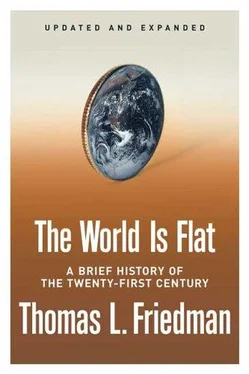As you sort out and weigh your multiple identities-consumer, employee, citizen, taxpayer, shareholder-you have to decide: Do you prefer the Wal-Mart approach or the Costco approach? This is going to be an important political issue in a flat world: Just how flat do you want corporations to be when you factor in all your different identities? Because when you take the middleman out of business, when you totally flatten your supply chain, you also take a certain element of humanity out of life.
The same question applies to government. How flat do you want government to be? How much friction would you like to see government remove, through deregulation, to make it easier for companies to compete on Planet Flat?
Said Congressman Rahm Emanuel, an Illinois Democrat who was a senior adviser to President Clinton, “When I served in the White House, we streamlined the FDA's drug approval process in response to concerns about its cumbersome nature. We took those steps with one objective in mind: to move drugs to the marketplace more quickly. The result, however, has been an increasingly cozy relationship between the FDA and the pharmaceutical industry, which has put public health at risk. The Vioxx debacle [over an anti-inflammatory drug that was found to lead to an increased risk for heart attacks and strokes] shows the extent to which drug safety has taken a backseat to speedy approval. A recent Senate hearing on Vioxx's recall revealed major deficiencies in the FDA's ability to remove dangerous drugs from the market.”
As consumers we want the cheapest drugs that the global supply chains can offer, but as citizens we want and need government to oversee and regulate that supply chain, even if it means preserving or adding friction.
Sort that out.
Who Owns What?
Something else is absolutely going to have to be sorted out in a flat world: Who owns what? How do we build legal barriers to protect an innovator's intellectual property so he or she can reap its financial benefits and plow those profits into a new invention? And from the other side, how do we keep walls low enough so that we encourage the sharing of intellectual property, which is required more and more to do cutting-edge innovation?
“The world is decidedly not flat when it comes to uniform treatment of intellectual property,” said Craig Mundie, Microsoft's chief technology officer. It is wonderful, he noted, to have a world where a single innovator can summon so many resources by himself or herself, assemble a team of partners from around the flat world, and make a real breakthrough with some product or service. But what does that wonderful innovative engineer do, asked Mundie, “when someone else uses the same flat-world platform and tools to clone and distribute his wonderful new product?” This happens in the world of software, music, and pharma-ceuticals every day. And the technology is reaching a point now where “you should assume that there isn't anything that can't be counterfeited quickly”-from Microsoft Word to airplane parts, he added. The flatter the world gets, the more we are going to need a system of global governance that keeps up with all the new legal and illegal forms of collaboration.
We can also see this in the case of patent law as it has evolved inside the United States. Companies can do one of three things with an innovation. They can patent the widget they invent and sell it themselves; they can patent it and license it to someone else to manufacture; and they can patent it and cross-license with several other companies so that they all have freedom of action to make a product-like a PC-that comes from melding many different patents. American patent law is technically neutral on this. But the way established case law has evolved, experts tell me, it is decidedly biased against cross-licensing and other arrangements that encourage collaboration or freedom of action for as many players as possible; it is more focused on protecting the rights of individual firms to manufacture their own patents. In a flat world, companies need a patent system that encourages both. The more your legal structure fosters cross-licensing and standards, the more collaborative innovation you will get. The PC is the product of a lot of cross-licensing between the company that had the patent on the cursor and the company that had the patent on the mouse and the screen.
The free-software person in all of us wants no patent laws. But the innovator in all of us wants a global regime that protects against intellectual property piracy. The innovator in us also wants patent laws that encourage cross-licensing with companies that are ready to play by the rules. “Who owns what?” is sure to emerge as one of the most contentious political and geopolitical questions in a flat world-especially if more and more American companies start feeling ripped off by more and more Chinese companies. If you are in the business of selling words, music, or pharmaceuticals and you are not worried about protecting your intellectual property, you are not paying attention.
And while you are sorting that out, sort this out as well. On November 13, 2004, Lance Cpl. Justin M. Ellsworth, twenty, was killed by a roadside bomb during a foot patrol in Iraq. On December 21, 2004, the Associated Press reported that his family was demanding that Yahoo! give them the password for their deceased son's e-mail account so they could have access to all his e-mail, including notes to and from others. “I want to be able to remember him in his words. I know he thought he was doing what he needed to do. I want to have that for the future,” John Ellsworth, Justin's father, told the AP. “It's the last thing I have of my son.” We are moving into a world where more and more communication is in the form of bits traveling through cyberspace and stored on servers located all over the world. No government controls this cyber-realm. So the question is: Who owns your bits when you die? The AP reported that Yahoo! denied the Ellsworth family their son's password, citing the fact that Yahoo! policy calls for erasing all accounts that are inactive for ninety days and the fact that all Yahoo! users agree at sign-up that rights to a member's ID or account contents terminate upon death. “While we sympathize with any grieving family, Yahoo! accounts and any contents therein are nontransferable” even after death, Karen Mahon, a Yahoo! spokeswoman told the AP. As we get rid of more and more paper and communicate through more and more digitized formats, you better sort out before you die, and include in your will, to whom, if anyone, you want to leave your bits. This is very real. I stored many chapters of this book in my AOL account, feeling it would be safest in cyberspace. If something had happened to me during my writing, my family and publisher would have had to sue AOL to try to get this text. Somebody, please, sort all this out.
Death of the Salesmen
In the fall of 2004, I went out to Minneapolis to visit my mother and had three world-is-flat encounters right in a row. First, before I left home in Washington, I dialed 411 -directory assistance-to try to get a friend's phone number in Minneapolis. A computer answered and a computerized voice asked me to pronounce the name of the person whose number I was requesting. For whatever reason, I could not get the computer to hear me correctly, and it kept saying back to me in a computerized voice, “Did you say...?” I kept having to say the family name in a voice that masked my exasperation (otherwise the computer never would have understood me). “No, I didn't say that... I said...” Eventually, I was connected to an operator, but I did not enjoy this friction-free encounter with directory information. I craved the friction of another human being. It may be cheaper and more efficient to have a computer dispense phone numbers, but for me it brought only frustration.
Читать дальше












